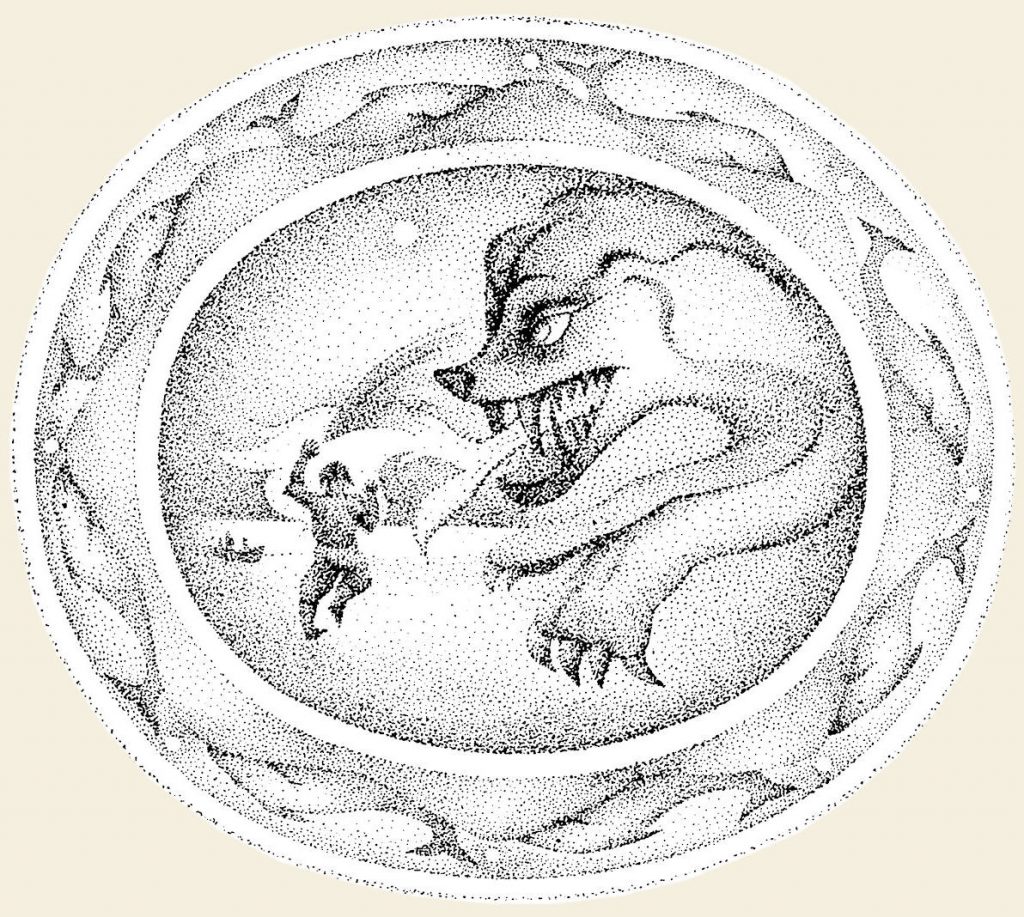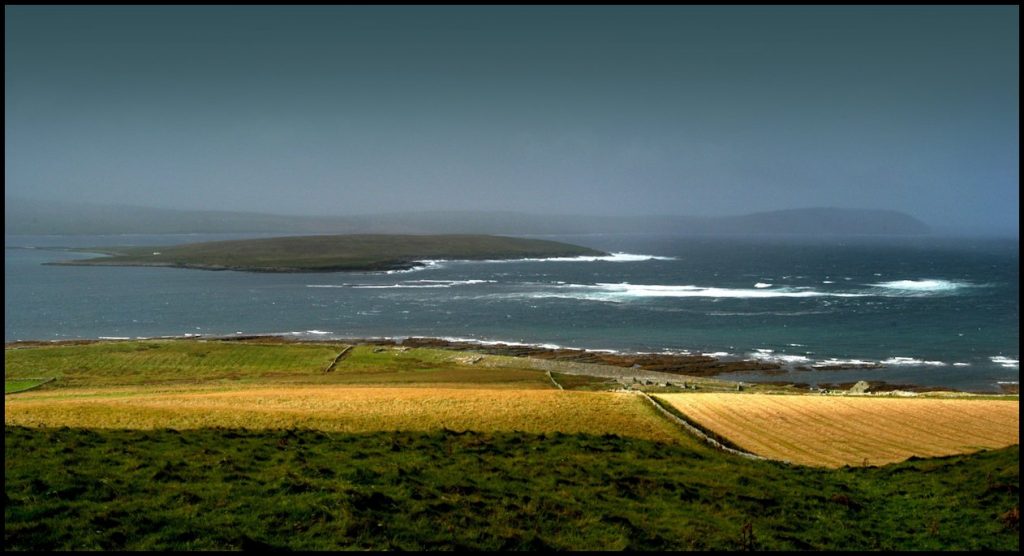The lovely little island of Eynhallow lies between the island of Rousay and the Mainland. It was not always there though, but was won from the Fin Folk by magic. Here is the tale as it has been told for hundreds of years.
The goodman of Thorodale married a woman and they had three fine, strong sons. But trouble was lurking not too far away, for the wife died. The man was left with the three boys who had now grown up to be young men. Thorodale took himself another wife, and she was said to be the boniest lass in all the parish of Evie. Thorodale loved his new wife very much and they lived for a time in happiness. One fine day Thorodale and his bonnie young bride were down in the ebb gathering shellfish. Thorodale sat down on some rocks to tie the lace of his rivlin [a type of shoe made from untanned hide]. His back was to his wife, and she was close to the edge of the water. Thorodale heard a terrible scream which made him leap to his feet. He turned just in time to see a dark man dragging his wife towards a boat. Thorodale ran towards them, but it was too late. The Fin man had his wife in the boat, and as Thorodale waded through the water the man pulled the oars and shot across the water. Thorodale ran to his own boat, pushing it into the water, but by the time he had got it afloat the Fin man’s boat was out of sight, sped on by his magic. Thorodale never saw his bonnie wife again, but he was not the sort of man to take such a blow lightly. He rolled up his breeches, took off his stockings, and went down on his knees below flood-mark and swore that, living or dead, he would take his revenge on the Fin Folk.
Many days and sleepless nights were spent deep in thought as Thorodale plotted how to avenge his loss. Try as he might, he could not think of a way to punish the Fin Folk. Then one day he went out in his boat to the fishing. He lay in the Sound between Rousay and the Mainland; there was no Eynhallow there in those days you see. As he lay there in the slack water he heard a woman singing. Thorodale recognised the voice at once, for it was that of his own dear wife. He could not see her, but he listened as she sang:
“Goodman, greet no more for me,
For me again you’ll never see;
If you would have of vengeance joy,
Go ask the wise spae-wife of Hoy.”
Thorodale headed to the shore as fast as he could row. He took his staff in his hand, put his silver in a stocking, and set off for the island of Hoy. He found the spae-wife, and told her his mission. She said that there was nothing that would hurt the Fin Folk more than to lose any part of Hilda-Land, their summer island homes. She taught him the spell that would let him see Hilda-Land, for it is usually hidden from human eyes. She also told him what to do when he did see it. Armed with this knowledge Thorodale returned home and waited.
For nine nights, when the moon was full, Thorodale travelled to the Odin Stone in Stenness. Nine times he went round the stone on his bare knees, then he looked through the hole in the stone and wished that he had the power to see Hilda-Land. On the ninth night he knew what he was to do. He went home, bought a large quantity of salt, and filled his meal girnel with it. Next to the girnel he set three caisies [straw baskets carried on the back], and he told his three sons to be ready to follow him when he gave the word.
One beautiful summer morning, just after the sun had risen, Thorodale went out and looked towards the sea. There I the middle of the Sound lay a pretty little island that had never been there before. He knew that if he took his eyes off it for one moment he would never see it again. He wasted no time, but shouted to his sons, “Fill the caisies, and hold for the boat.”
The three sons ran to the boat, each one carrying a caisie of salt on his back. They joined their father in the boat and pushed her out to sea. Thorodale never once took his eyes off the island, for he was the only one who could see it.
Suddenly, the boat was surrounded by a school of whales. The sons wanted to set after them and drive them onto the shore, but Thorodale knew better. They were only a magic trick of the Fin Folk to try and distract the men from their mission. Thorodale cried, “Pull for bare life! And the Devil drook [drench] the delayer!” A giant whale lay between the boat and the island and it slowly turned and headed towards the boat. It opened its huge mouth so the young men thought that it would swallow the boat, and them with it. Thorodale, who was standing in the bow of the boat, thrust both hands into the nearest caisie and scooped up the salt. He threw it into the monster’s gaping mouth and it disappeared in an instant, for it was only a trick of the Fin Folk.
As the boat headed towards the shores of Hilda-Land, two beautiful mermaids stood singing. They were naked from head to waist and their golden hair floated around their snow-white skin like dancing sunbeams. The song that they sang was so lovely that it went to the hearts of the rowers, and they started to slow down. Thorodale gave the two sons nearest to him a hard kick on their backs, saying to the mermaids, “Be gone, you unholy limmers; here is your warning,” and he threw crosses made from dried tangles [kelp stems] at the mermaids. They screamed, and sprang into the sea.
At last the boat touched the beach of Hilda-Land and Thorodale leapt out. There in front of him stood a terrible monster. It had tusks as long as a man’s arm and feet as broad as quern stones. The monster’s eyes blazed in its head, and it spat fire from its mouth. Thorodale took a handful of salt and threw it at the monster, hitting it right between the eyes. It disappeared, giving a terrible growl as it did so.

Then there stood in front of Thorodale a mighty man, tall and dark with hate in his eyes. In his hand he held a sword, and he roared out a challenge. “Go back, you human thieves, that come to rob the Fin Folk’s land! Be gone! Or, by my father’s head, I’ll defile Hilda-Land with your nasty blood!” His speech frightened the sons, who called out, “Come home, father, come home!” The Fin man made a thrust at Thorodale’s breast with his sword, but Thorodale was too quick for him. He sprang to one side and threw a cross at the Fin man. The cross was made out of a kind of sticky grass known as cloggirs, twisted together. It stuck to the Fin man’s face and he roared with pain. The Fin Folk are heathen, and cannot bear the sight or touch of the cross. Unable to brush it away, the Fin man ran off roaring in pain and anger. Thorodale smiled; he had seen that Fin man before; he was the one who had stolen his wife.
He shouted to his sons who were sitting in the boat, amazed by what they saw. “Come out of that, you duffers! And take the salt ashore!” The sons went ashore, each one carrying a caisie of salt. Then their father made them walk abreast around the island, scattering salt as they went. When they began to sow the salt there arose a terrible noise and commotion throughout the island. The Fin Folk and their cattle all ran helter-skelter to the sea like a flock of sheep with a score of mad dogs behind them. The men roared, the mermaids screamed, and the cattle bellowed like it was the end of the world. It was awful to hear them. At last every soul and mother-son of them, and every hair of their cattle had taken to the sea, leaving only the four men to carry out their task.
As the rings of salt were growing around the island Thorodale took out a knife and cut nine crosses in the turf of the island. The three sons had sown three rings each around the island, making nine rings of salt in all. Well almost nine rings, for you see the youngest son had large hands and he ran out of salt before he had finished his last ring. He asked his brothers for salt to finish it, but they said that they had none to spare. So the last ring of salt was never finished, and that is why Eynhallow is still a magical place. No rats, cats or mice can live on the island. No iron stakes will remain in the ground after sunset. They jump right out, freeing any cattle, sheep or horses that are tethered there. They say that if you cut corn after the sun has gone down on Eynhallow the stalks will bleed.
That was the story of how the Fin Folk lost part of Hilda-Land. The island was called Hyn-hallow, for it was the hinmost holy, that is, the last island to be made holy. And that is all that I can tell you about it
My thanks to Tom Muir for allowing me to reproduce this from
his book The Mermaid Bride and other Orkney Folk Tales,
and to Bryce Wilson for the use of his illustration.
